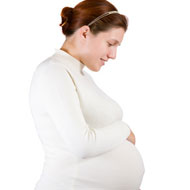- General Articles
- General Pregnancy Questions
- Baby Growth
- Pregnancy Diet
- Miscarriage
- During Pregnancy
- Twin Pregnancy
- Toddler Meals
- Home Remedies During Pregnancy
- Breastfeeding
- Pregnancy Week By Week
- Pregnancy Tests
- Ectopic Pregnancy
- Pregnancy Signs and Symptoms
- Pregnancy Stages
- Potty Training
- Fetal Development
- Preschooler
- Postpartum Depression
- Toddler Illness
- Baby Care
- After Pregnancy
- Molar Pregnancy
- During Delivery
- Beauty and Style
- Pregnancy Clothing
- Preconception
- Fertility
Hair Breakage During Pregnancy
Each month of pregnancy brings with it a number of changes. During the first month, after successful fertilization, the zygote embeds itself in the uterine wall. This process is called implantation. Many women experience mild cramps in the pelvic region and mild spotting as the fertilized egg burrows into the uterine wall. The most significant sign of pregnancy is the cessation of menstrual periods. The hormone hCG is produced on successful implantation. This hormone is responsible for the nausea and vomiting which are major pregnancy symptoms.
During the term of the pregnancy, the production of the hormones progesterone and estrogen also increase. They keep the uterine conditions suitable for the progress of the pregnancy and are responsible for heavy vaginal discharge. These hormones also contribute to irritability, headaches, fatigue and mood swings.
An increase in the frequency to urinate is another common symptom of early pregnancy. Breast tenderness is another known symptom of pregnancy triggered by hormonal alterations in the body. All these symptoms are typically experienced in the second and third months of pregnancy and begin to wane after this period. Hair loss during pregnancy and hair breakage during pregnancy are two common effects of hormonal changes occurring at this time. The increased hormones make hair dry, dull and weak. A deficiency of certain nutrients can also result in hair falling out during pregnancy. Consuming a well balanced diet and following a regular exercise routine can prevent hair fall to some extent.
In the fourth month, the tummy begins to show, beginning with a slight bulge. During the fifth and sixth month, the baby continues to develop and the uterus continues to grow to accommodate the growing baby. These monthly changes during pregnancy often result in lower back pain and pain in the legs. Swelling is also observed as a result of water retention. During this trimester, most women feel more energetic than the first trimester.
The onset on the seventh month calls for increased medical monitoring of the pregnancy, month by month and follow-ups with the doctor. The ever-increasing waistline makes sleeping comfortably difficult. Sitting and standing may also become awkward as the body’s balance gets affected by the expanding uterus. Towards the end of the pregnancy term, the abdomen falls low as the baby prepares for childbirth. This is called lightening. The expulsion of the mucus plug is also experienced after the 36th week of gestation. Most women go into labor in the 38th week of pregnancy, bringing an end to the long wait to motherhood.
Read more articles from the During Pregnancy Category.



 7 Must-Haves Before Your Baby Arrives
7 Must-Haves Before Your Baby Arrives Bonding Games for Babies
Bonding Games for Babies DIY Baby Bath Towel Apron
DIY Baby Bath Towel Apron Common Late Pregnancy Fears
Common Late Pregnancy Fears